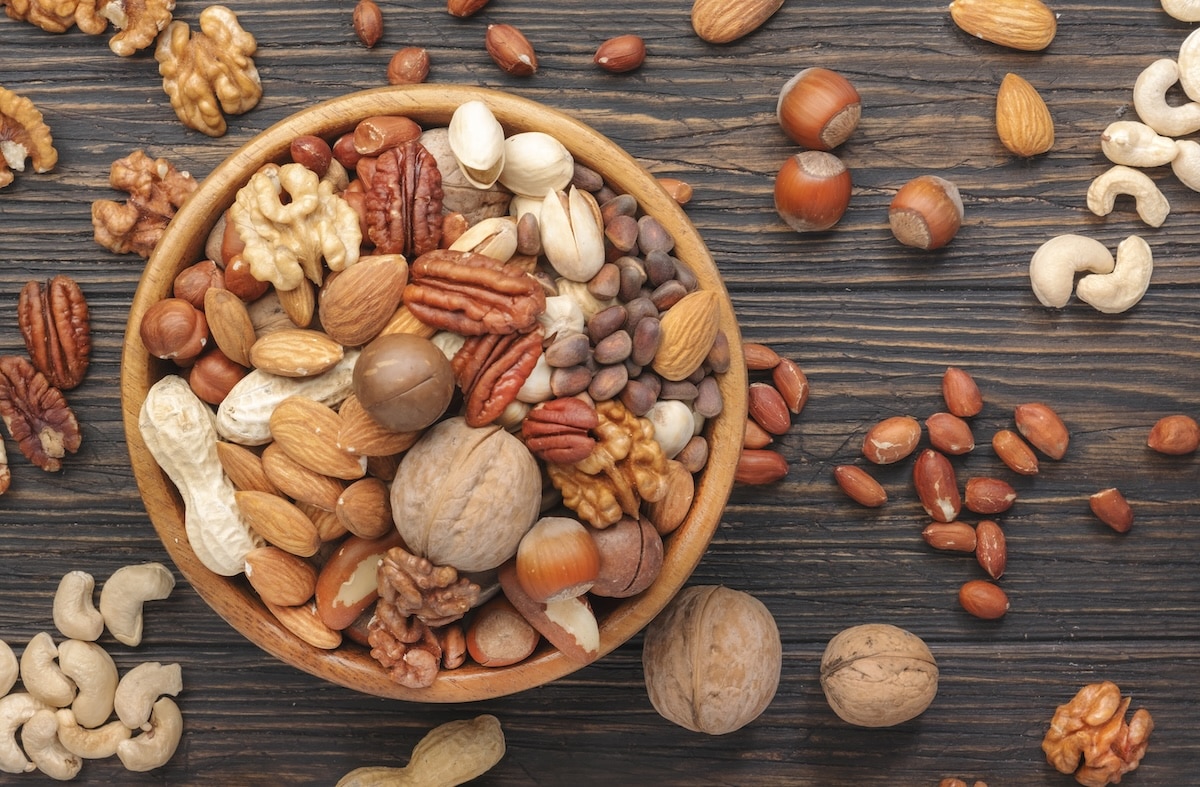The review, recently published in Nutrients, included commonly consumed nuts such as peanuts, almonds, walnuts, hazelnuts and pistachios, as well as seeds like sunflower and sesame, and in some studies, corn and popcorn.
Pooling data from nine observational studies covering more than two million person-years*, the researchers found no evidence that eating nuts is harmful in diverticulosis – and even some indications that nuts and seeds may offer modest protection against inflammation in the belly.
Diverticulosis refers to the presence of diverticula – small sac-like protrusions of the intestinal wall, usually in the colon. Most people with diverticulosis are asymptomatic. When one or more of these pouches become inflamed or infected, it is called diverticulitis, causing abdominal pain, fever, and changes in bowel habits; complications can include abscess, perforation, or bowel obstruction.
 “Doctors have for decades advised patients with diverticulosis to avoid nuts and seeds, fearing that small particles might lodge in intestinal pouches and cause inflammation. That advice became widespread despite little supporting data,” says Dr Constantinos Voniatis, first author of the study and a junior doctor at Semmelweis University’s Department of Surgery, Transplantation and Gastroenterology. “Although some research has since questioned this old belief, patients still often receive mixed messages. Our review brings together the available evidence and finally putting this myth to rest.”
“Doctors have for decades advised patients with diverticulosis to avoid nuts and seeds, fearing that small particles might lodge in intestinal pouches and cause inflammation. That advice became widespread despite little supporting data,” says Dr Constantinos Voniatis, first author of the study and a junior doctor at Semmelweis University’s Department of Surgery, Transplantation and Gastroenterology. “Although some research has since questioned this old belief, patients still often receive mixed messages. Our review brings together the available evidence and finally putting this myth to rest.”
The Semmelweis researchers used several complementary methods to ensure reliable results. They first assessed the quality of each study and possible sources of bias (qualitative synthesis and risk-of-bias assessment). Then they combined the numerical data from all studies to calculate the overall risk of developing diverticulitis in relation to nut consumption (quantitative meta-analysis). They also tested whether the results changed when considering that people who eat more nuts often follow generally healthier diets – typically higher in fibre, fruit and vegetables (sensitivity analysis). They then examined how different levels of nut consumption affected the risk (dose–response modelling).
In the nut-specific cohort analyses, nut eaters had about an 11% lower risk to develop diverticulitis than those who didn’t consume them in asymptomatic periods, though this result did not reach statistical significance. In a sensitivity analysis that adjusted for overall healthy dietary patterns, the hazard ratio fell to 0.75, indicating a statistically significant 25% lower risk.
According to the dose–response analysis, moderate weekly consumption of nuts and seeds – at least two servings per week, each of about 28 grams – was associated with roughly a 5% lower risk.
Among the nine studies included in the review, six suggested protective trends, two were neutral, and one (focusing on betel-nut chewing, which is not comparable to eating culinary nuts) showed possible harm but was considered an outlier.
In 2008, a large U.S. cohort of over 47,000 men challenged the widespread notion by showing no link between nut or popcorn consumption and diverticular disease, sparking debate and prompting more research.
Current guidelines no longer recommend avoiding nuts, seeds or popcorn between flare-ups for people with diverticulosis. The American Gastroenterological Association and the UK’s National Institute for Health and Care Excellence (NICE) both state that there is no need to exclude these foods from the diet.
Diverticulosis is more common in older adults: around 15–30% of people aged 50–59 and up to 60% of those over 70 have diverticula visible on colon imaging. Rates are similar in men and women, though the age at onset can differ by sex and region. Over a lifetime, about 10% of people with diverticulosis develop diverticulitis.
Proven strategies for preventing diverticulitis – such as a high-fibre diet including moderate nut intake, regular physical activity, weight control, avoiding smoking and monitoring symptoms – remain central,
adds Dr Voniatis.
During a flare-up, patients should promptly contact their doctor for advice on the right treatment plan and diet, and on antibiotics if required.
The Semmelweis researchers conclude that further studies are needed to confirm these latest findings.
*The number of participants multiplied by the years of follow-up.
Photo: Balint Barta – Semmelweis University; Cover photo and illustration: Envato Elements – Olga_Kochina



